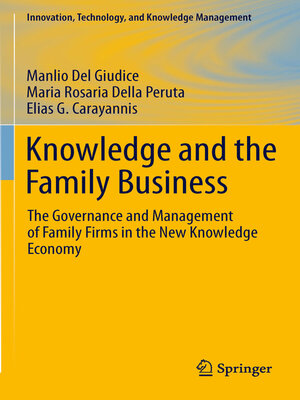Knowledge and the Family Business
ebook ∣ The Governance and Management of Family Firms in the New Knowledge Economy · Innovation, Technology, and Knowledge Management
By Manlio Del Giudice

Sign up to save your library
With an OverDrive account, you can save your favorite libraries for at-a-glance information about availability. Find out more about OverDrive accounts.
Find this title in Libby, the library reading app by OverDrive.



Search for a digital library with this title
Title found at these libraries:
| Loading... |
Family businesses—the predominant form of business organization around the world—can make numerous, critical contributions to the economy and family well-being in both financial and qualitative terms. But dysfunctional family businesses can be difficult to manage, painful experiences at best, and they can destroy family wealth and personal relationships. This book explores the dynamics of family business management, in the context of constantly changing market conditions and the role that knowledge management plays in strategic planning and adaptation. Integrating the literature from family business, entrepreneurship, industrial psychology, and knowledge management, and with illustrative examples from a variety of enterprises, the authors address such topics as: How family businesses can compete in the new knowledge economy
How to manage a family business when knowledge is its main asset
How to transfer knowledge (and how to keep it alive) through family generations Within this framework, the authors argue that effective resource management—especially intangible resources—is central to enabling a family-run organization to maintain a sustainable competitive advantage over time. They note that families often develop systemic, intuitive, or tacit knowledge that transcends rational decision making and needs to be recognized and nurtured as a distinctive asset. The authors demonstrate that trans-generational value is achieved when the family firm innovates and adapts itself to changing external and internal conditions. This kind of entrepreneurial performance requires dynamic capabilities and processes designed to acquire, exchange, combine and even shed knowledge and practices; and, in turn, dynamic capabilities result from mechanisms of knowledge sharing, collective learning, experience accumulation, and transfer.






